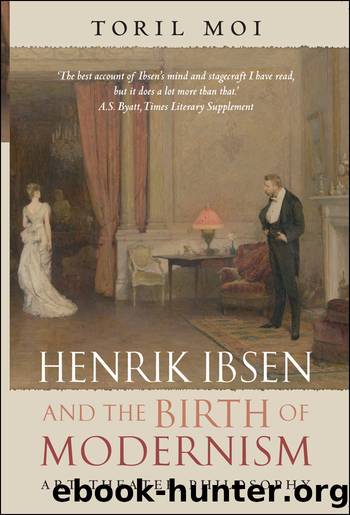Henrik Ibsen and the Birth of Modernism by TORIL MOI

Author:TORIL MOI
Language: eng
Format: epub
Publisher: Oxford University Press
Published: 2006-07-14T16:00:00+00:00
That Julian identifies with Dionysus is obvious. He too feels misunderstood and ridiculous. His insistence that Dionysus, not Apollo, is the god of poets and seers serves to underline his wish to communicate with his people. By choosing the god of ecstasy, Julian also expresses his hope that he might overcome his separation from others by losing his painful self-consciousness in ecstasy and mysticism.
It is hard to say whether Ibsen got this from Nietzsche. Reading Emperor and Galilean after Nietzsche, it is difficult not to see connections. Yet most of the elements mentioned here could have been derived from historical knowledge about Julian’s life, or from fairly superficial accounts of Nietzsche’s book. Given the state of the evidence, the only conclusion one can draw is the obvious one, which is that in 1872 Ibsen and Nietzsche certainly shared a preoccupation with Apollo and Dionysus and with the question of what theater is and what it could be in European modernity.
Finally, to turn the question of influence on its head, it is possible that Nietzsche was inspired by Emperor and Galilean.32 In fragment 984 of The Will to Power, written in 1884, Nietzsche writes about “the Roman Caesar with Christ’s soul”, a phrase that Walter Kaufmann considers to be “the very heart of Nietzsche’s vision of the overman”, and which readers of Emperor and Galilean can’t fail to associate with Ibsen’s hovedverk.33
Download
This site does not store any files on its server. We only index and link to content provided by other sites. Please contact the content providers to delete copyright contents if any and email us, we'll remove relevant links or contents immediately.
| African | Asian |
| Australian & Oceanian | Canadian |
| Caribbean & Latin American | European |
| Jewish | Middle Eastern |
| Russian | United States |
4 3 2 1: A Novel by Paul Auster(11080)
The handmaid's tale by Margaret Atwood(6881)
Giovanni's Room by James Baldwin(5901)
Big Magic: Creative Living Beyond Fear by Elizabeth Gilbert(4741)
Asking the Right Questions: A Guide to Critical Thinking by M. Neil Browne & Stuart M. Keeley(4609)
On Writing A Memoir of the Craft by Stephen King(4230)
Ego Is the Enemy by Ryan Holiday(4010)
Ken Follett - World without end by Ken Follett(3984)
The Body: A Guide for Occupants by Bill Bryson(3831)
Bluets by Maggie Nelson(3731)
Adulting by Kelly Williams Brown(3687)
Guilty Pleasures by Laurell K Hamilton(3604)
Eat That Frog! by Brian Tracy(3533)
White Noise - A Novel by Don DeLillo(3447)
The Poetry of Pablo Neruda by Pablo Neruda(3375)
Alive: The Story of the Andes Survivors by Piers Paul Read(3326)
The Book of Joy by Dalai Lama(3243)
The Bookshop by Penelope Fitzgerald(3242)
Fingerprints of the Gods by Graham Hancock(3230)
